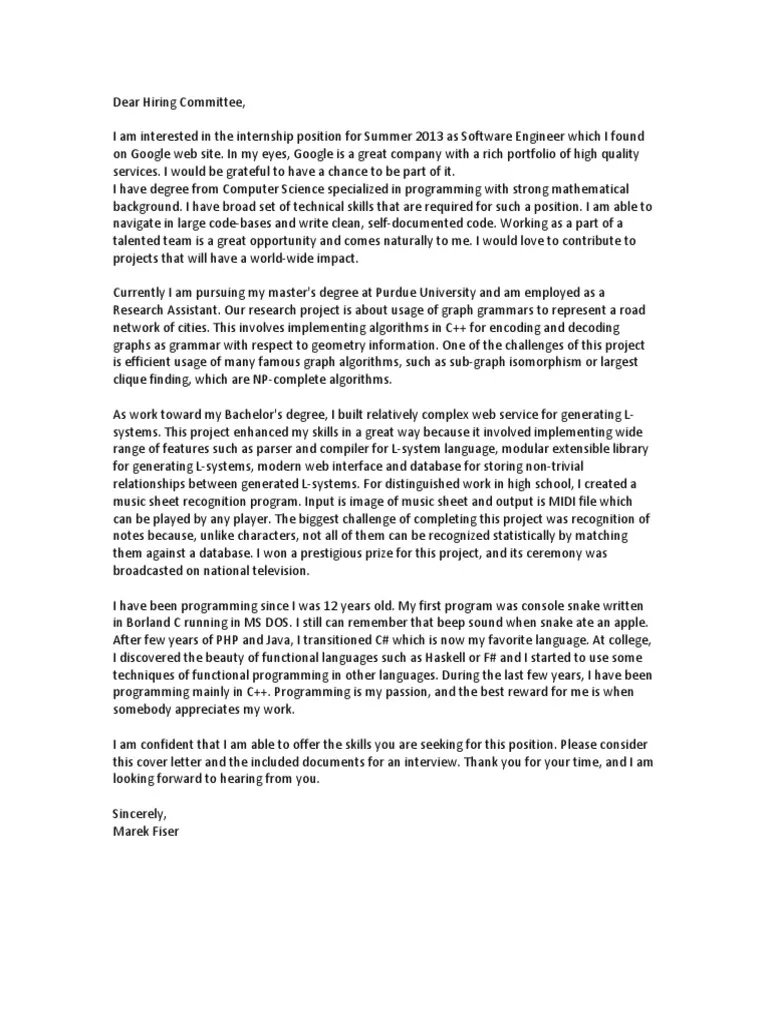Why a Stellar Cover Letter Matters
In the competitive world of software engineering internships, a well-crafted cover letter can be your golden ticket to success. It’s often the first impression you make on a potential employer, and it provides you with a unique opportunity to showcase your personality, passion, and relevant skills. Unlike a resume, which is a factual summary of your experience, a cover letter allows you to tell a story, explaining why you’re the ideal candidate for the specific internship. A strong cover letter demonstrates your communication skills, your understanding of the company’s needs, and your genuine interest in the role, setting you apart from other applicants who might rely solely on their resumes. Without a compelling cover letter, your application might get lost in the shuffle, missing the chance to highlight your potential and secure your desired internship.
Highlighting Relevant Skills
Your cover letter is the perfect platform to spotlight the skills that align with the software engineering internship you’re targeting. Don’t just list your technical proficiencies; elaborate on how you’ve applied them. Mention specific projects where you’ve utilized programming languages like Java, Python, or C++, and explain the outcomes of those projects. If the internship description emphasizes specific software or tools, such as Git, AWS, or specific frameworks, make sure to highlight your familiarity with those technologies. Briefly describe the challenges you faced and how you overcame them, demonstrating your problem-solving abilities. Tailor your skill descriptions to match the job description, ensuring that you emphasize the skills that the employer values most. This targeted approach shows the recruiter that you’ve done your homework and are a great fit for their needs.
Technical Skills to Showcase
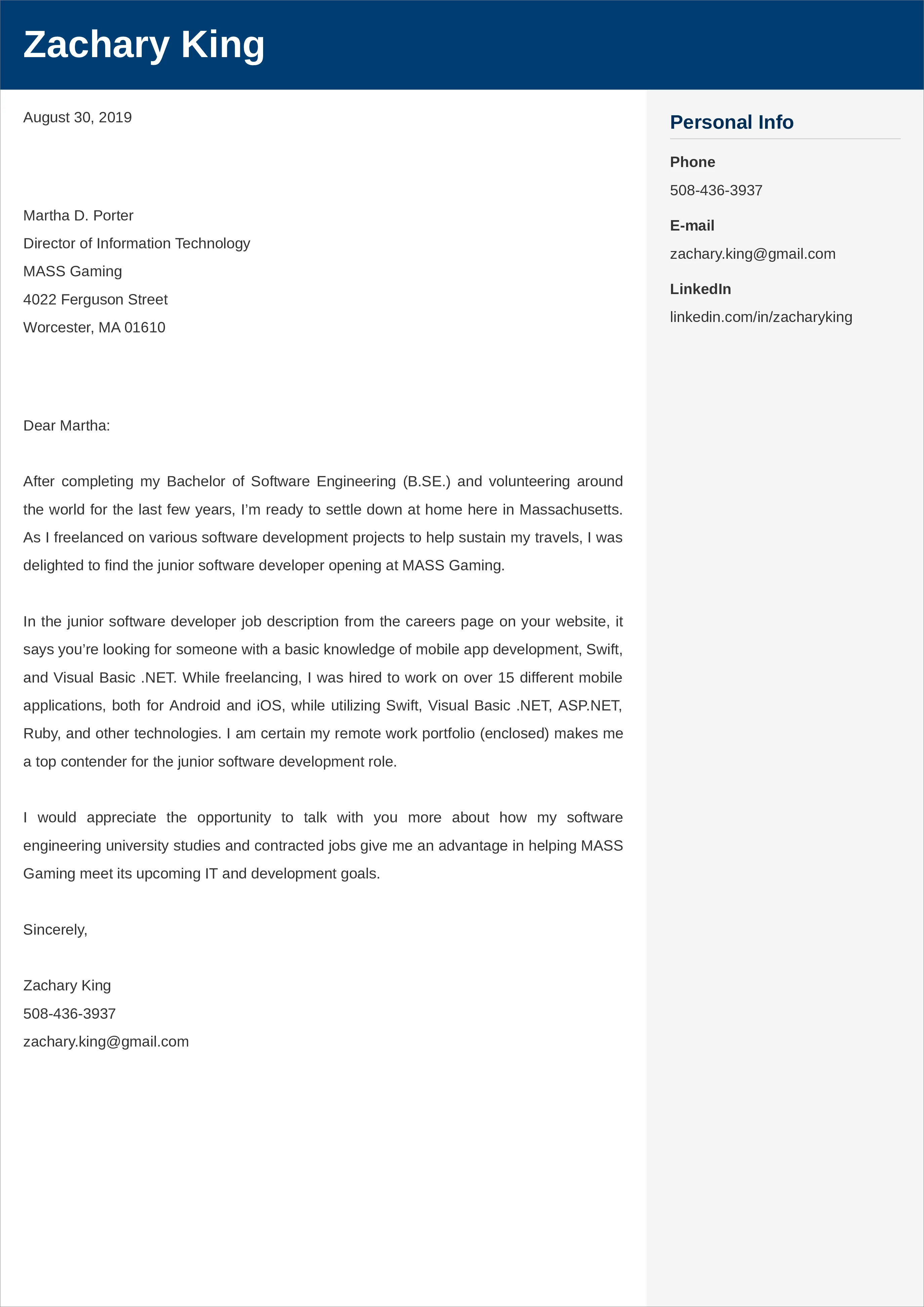
Software engineering internships require a robust set of technical skills. When outlining these in your cover letter, go beyond listing the languages you know. For example, if you are proficient in Java, specify whether you’ve worked with specific frameworks like Spring or Hibernate. If you have experience with Python, detail projects where you’ve used libraries such as Pandas or NumPy. Mention your understanding of data structures and algorithms, crucial for problem-solving in the field. Also, include experience with version control systems like Git, which is standard in professional environments. Highlight your knowledge of databases, such as SQL or NoSQL, and any experience with cloud platforms like AWS, Azure, or Google Cloud. By detailing your technical skills, you show that you’re well-equipped to contribute meaningfully to the internship.
Project Experience
Project experience is a cornerstone of a compelling cover letter. Detail any projects you’ve undertaken, whether academic, personal, or part of a previous internship. Clearly describe the project’s purpose, your role, and the specific technologies you used. Quantify your achievements whenever possible. Instead of saying you “worked on a website”, specify the features you developed or the impact your work had. Did you improve efficiency by a certain percentage? Did your code handle a specific volume of data? These details provide concrete evidence of your capabilities and your ability to deliver results. If possible, include links to your projects, such as a GitHub repository or a live website, to allow the potential employer to see your work firsthand. Showcasing your projects is a powerful way to illustrate your practical skills and your dedication to software engineering.
Quantifiable Achievements
Quantifiable achievements transform your cover letter from a list of tasks into a showcase of your impact. Whenever possible, support your claims with numbers and metrics. For instance, instead of stating that you “improved the user interface”, you could say that you “reduced user navigation time by 20%”. If you debugged code, mention the number of bugs you resolved or the reduction in error rates. If you contributed to a team project, quantify your contribution by citing your role in the project’s completion or any positive outcomes resulting from your work. Using metrics shows that you are focused on results and have a strong understanding of how your work impacts the company’s goals. Quantifiable achievements are a persuasive way to demonstrate your value and set yourself apart from other applicants.
Tailoring Your Cover Letter
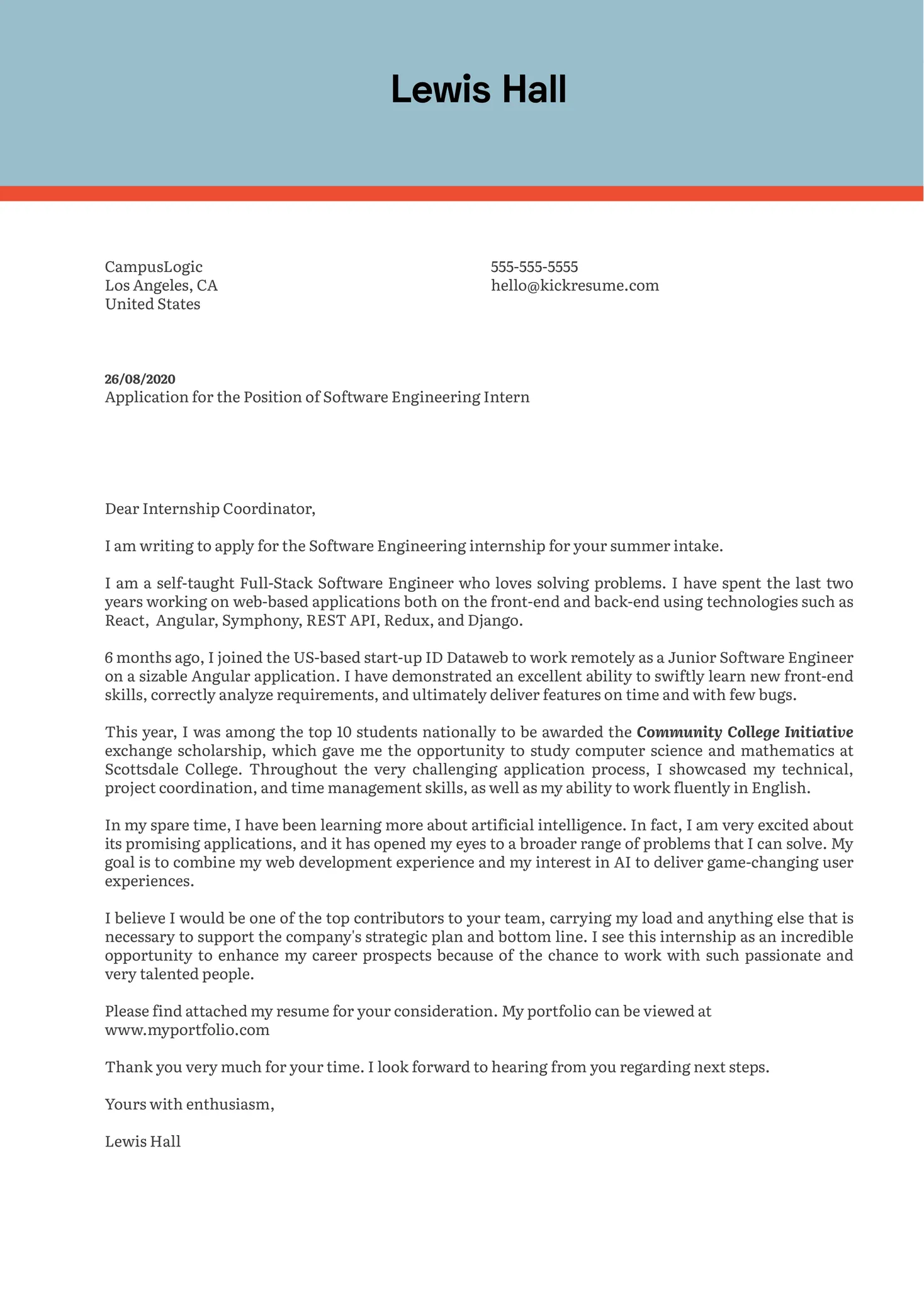
One of the most critical steps in writing a standout cover letter is tailoring it to the specific software engineering internship and company you’re applying for. Generic cover letters are easily spotted and often discarded. The goal is to demonstrate that you’ve researched the company and understand their culture, values, and the specifics of the internship. Begin by carefully reviewing the job description. Identify the key skills, experiences, and qualities that the employer is seeking. Use this information to customize your letter, highlighting the most relevant aspects of your background and explaining how they align with the company’s needs. Show that you’re not just sending a generic application, but you’re genuinely interested in this particular opportunity and how you can contribute. Tailoring your cover letter shows your dedication and attention to detail, significantly increasing your chances of getting an interview.
Researching the Company
Before you start writing, thoroughly research the company. Visit their website, read their blog, and explore their social media profiles. Understand their products or services, their mission, and their values. Look for recent news or announcements that might provide insights into their current projects or priorities. This research allows you to identify specific aspects of the company that resonate with you, which you can then mention in your cover letter. By demonstrating your knowledge of the company, you show that you’re not just applying for any internship but are genuinely interested in working there. You can also use this research to tailor your letter by highlighting how your skills and experience align with their specific projects or needs. This targeted approach indicates that you’re serious about the opportunity and have taken the time to understand what the company does and what they value.
Customizing Your Application
Once you’ve researched the company, customize your cover letter to reflect your understanding of their needs and your genuine interest in the role. Address the hiring manager by name if possible; this shows that you’ve taken the time to personalize your application. In the body of your letter, highlight how your skills and experience align with the specific requirements of the internship. Explain why you are interested in working for the company, and how your values align with theirs. Reference any projects, technologies, or areas of interest that are relevant to their work. If you come across a recent company achievement or project that excites you, mention it and explain how you could contribute. By clearly connecting your qualifications with the company’s specific needs, you’ll demonstrate your suitability for the role and increase your chances of making a strong impression.
Formatting and Tone
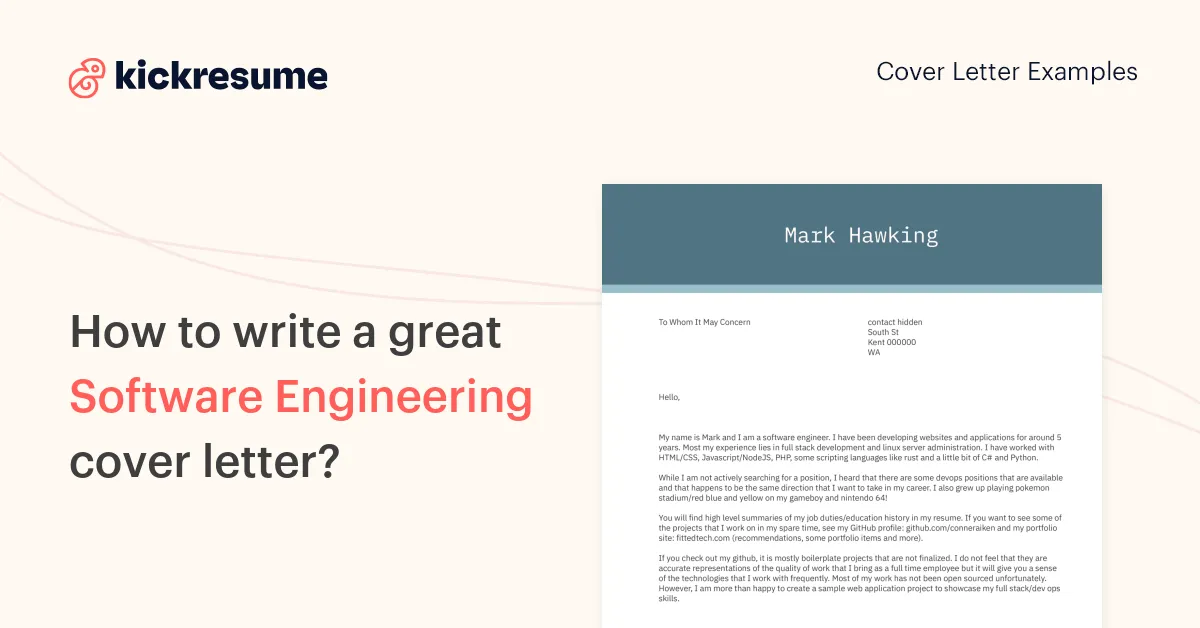
The formatting and tone of your cover letter are crucial for making a positive impression. Your cover letter should be professional, concise, and easy to read. Choose a clean, readable font such as Arial or Times New Roman, and use a standard font size (11 or 12 points). Keep your paragraphs short and focused, and use bullet points to highlight key skills or achievements. The tone should be enthusiastic but professional, avoiding overly casual language. Avoid clichés and generic phrases; instead, use specific examples to demonstrate your skills and experiences. Maintain a positive and confident tone throughout the letter, emphasizing your enthusiasm for the opportunity. A well-formatted and professionally written cover letter shows that you pay attention to detail and are committed to presenting yourself in the best possible light.
Professional Formatting
Professional formatting enhances readability and makes your cover letter stand out. Use a standard business letter format, with your contact information at the top, followed by the date and the hiring manager’s name and address. Ensure that your letter is well-organized, with clear headings and subheadings if necessary. Use ample white space to avoid a cluttered appearance. Break up large blocks of text into shorter paragraphs to maintain reader engagement. Employ bullet points strategically to emphasize key skills, experiences, or accomplishments. Make sure the letter is properly aligned and that there are no inconsistencies in spacing or font usage. A well-formatted cover letter conveys professionalism and attention to detail, which are essential qualities for a software engineering intern.
Avoiding Common Mistakes
Several common mistakes can undermine the effectiveness of your cover letter. Avoid generic language and clichés that make your letter sound impersonal. Do not simply repeat information from your resume; instead, use the cover letter to expand on your experiences and explain how they relate to the specific internship. Steer clear of grammatical errors and typos, which can damage your credibility. Avoid overly casual language, slang, or jargon. Keep your cover letter concise; aim for a maximum of one page. Ensure that your letter is free of negativity or complaints about previous employers or experiences. Do not oversell yourself or make unrealistic claims about your abilities. By avoiding these common pitfalls, you’ll create a more polished and persuasive cover letter that showcases your strengths effectively.
Proofreading and Editing
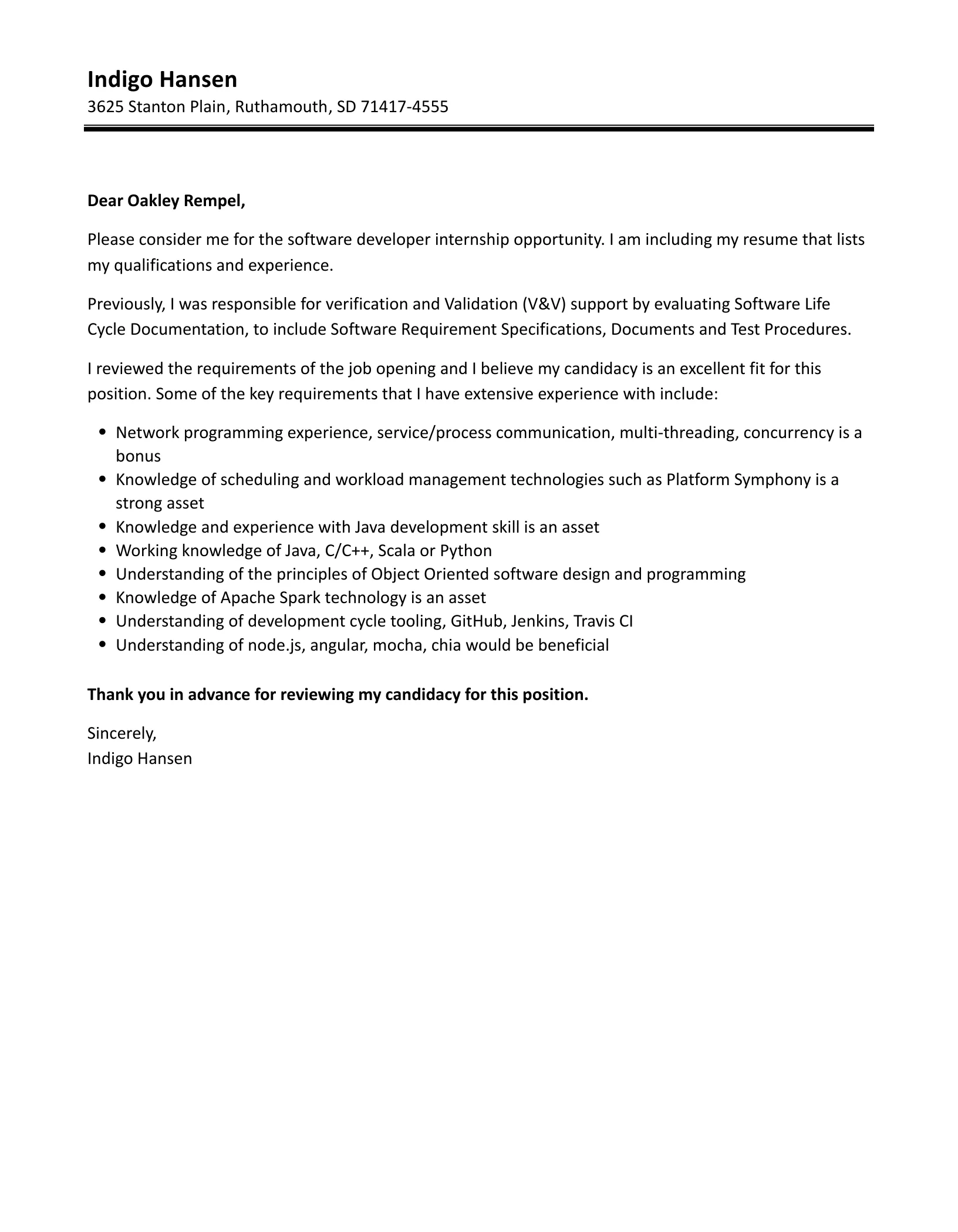
Proofreading and editing are essential steps in the cover letter writing process. Before submitting your application, carefully proofread your letter to catch any errors in grammar, spelling, and punctuation. Read your letter aloud to identify awkward phrasing or sentences that don’t flow smoothly. Consider asking a friend, professor, or career advisor to review your cover letter and provide feedback. They may catch errors or suggest improvements that you’ve missed. Make sure that your letter is concise and well-organized, and that the formatting is consistent. It’s also a good practice to proofread your letter one final time just before submitting it to the application. A polished and error-free cover letter demonstrates your attention to detail and your commitment to presenting yourself professionally, significantly increasing your chances of landing the software engineering internship.
